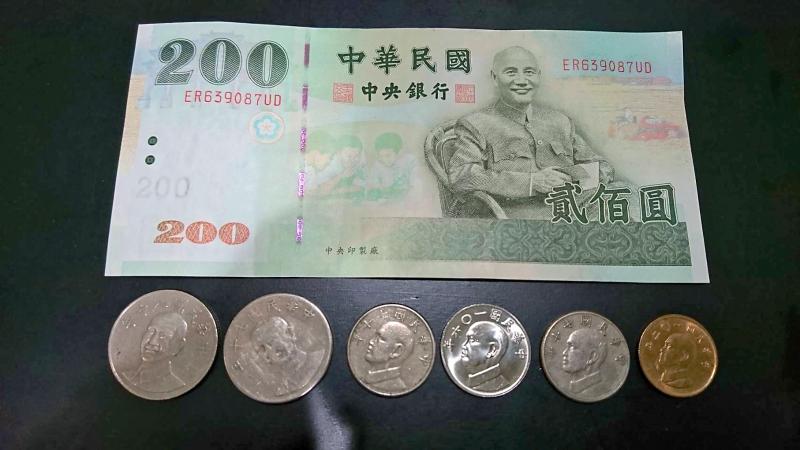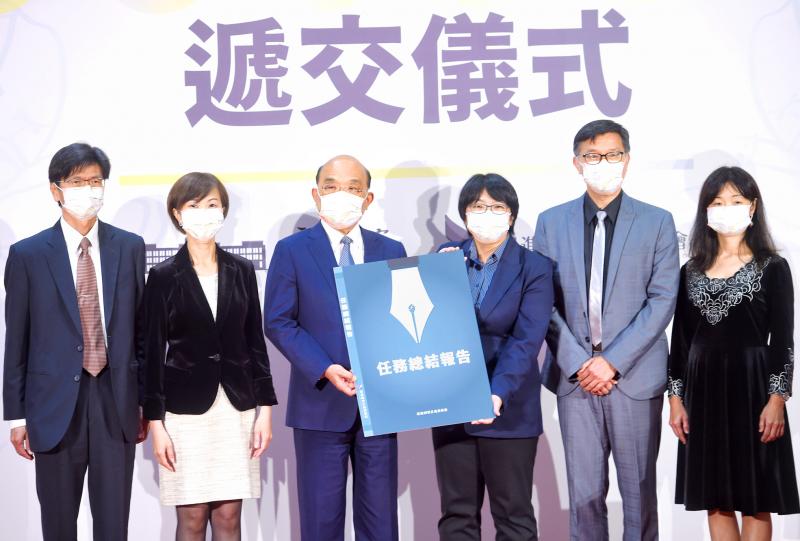Chiang Kai-shek (蔣介石) should be removed from Taiwanese banknotes and coins, the Transitional Justice Commission said in its final report as the ministy-level organization prepares to close tomorrow.
Chiang’s likeness should be removed from coins and notes when the central bank carries out a redesign of the nation’s currency, said the report, an official copy of which was handed to Premier Su Tseng-chang (蘇貞昌) by the commission’s acting minister Yeh Hung-ling (葉虹靈) at a ceremony in Taipei on Friday.
Images of Chiang are on NT$1 and NT$5 coins, and NT$200 banknotes.

Photo: Chen Yu-fu, Taipei Times
Citing the findings of two expert panels that the commission organized in 2019, the report said the purpose of currency design is to promote symbols and values that unify the nation and represent it to the outside world.
The prominence of Chiang and Sun Yat-sen (孫逸仙) on money suggests an overemphasis on political leadership and the glorification of “strongmen,” which is at odds with democratic norms, it said.
Chiang’s “dictatorial” reign was responsible for “undermining the democratic constitutional order, utilizing state violence and human rights infringements,” it said.

Photo: Fang Pin-chao, Taipei Times
Putting Chiang on coins and banknotes implies that an authoritarian ruler is the nation’s unifying symbol and that his regime represents its values, the report said.
The government has a legal responsibility to remove authoritarian symbols under the Act on Promoting Transitional Justice (促進轉型正義條例), which supersedes the central bank’s concerns about costs, it said.
Coins and banknotes bearing Chiang’s image should be taken out of circulation and replaced with new designs to be selected via an appropriate process that enables civic participation, the report said.
The replacement designs should underscore the nation’s cultural distinctiveness, natural landscape and the progressive values of cultural diversity, gender equality and environmentalism, it said.
The process should be conducted bearing in mind the need to facilitate societal dialogue and the formation of national identity, it said.
The report also made three suggestions regarding the Chiang Kai-shek Memorial Hall in Taipei.
The statue of Chiang at the hall should be relocated, the function and appearance of the hall should be altered and anything in the park related to the “worship” of authoritarian figures should be removed, it said.
Additional reporting by CNA

INVESTIGATION: The case is the latest instance of a DPP figure being implicated in an espionage network accused of allegedly leaking information to Chinese intelligence Democratic Progressive Party (DPP) member Ho Jen-chieh (何仁傑) was detained and held incommunicado yesterday on suspicion of spying for China during his tenure as assistant to then-minister of foreign affairs Joseph Wu (吳釗燮). The Taipei District Prosecutors’ Office said Ho was implicated during its investigation into alleged spying activities by former Presidential Office consultant Wu Shang-yu (吳尚雨). Prosecutors said there is reason to believe Ho breached the National Security Act (國家安全法) by leaking classified Ministry of Foreign Affairs information to Chinese intelligence. Following interrogation, prosecutors petitioned the Taipei District Court to detain Ho, citing concerns over potential collusion or tampering of evidence. The

‘FORM OF PROTEST’: The German Institute Taipei said it was ‘shocked’ to see Nazi symbolism used in connection with political aims as it condemned the incident Sung Chien-liang (宋建樑), who led efforts to recall Democratic Progressive Party (DPP) Legislator Lee Kun-cheng (李坤城), was released on bail of NT$80,000 yesterday amid an outcry over a Nazi armband he wore to questioning the night before. Sung arrived at the New Taipei City District Prosecutors’ Office for questioning in a recall petition forgery case on Tuesday night wearing a red armband bearing a swastika, carrying a copy of Adolf Hitler’s Mein Kampf and giving a Nazi salute. Sung left the building at 1:15am without the armband and apparently covering the book with a coat. This is a serious international scandal and Chinese

Seventy percent of middle and elementary schools now conduct English classes entirely in English, the Ministry of Education said, as it encourages schools nationwide to adopt this practice Minister of Education (MOE) Cheng Ying-yao (鄭英耀) is scheduled to present a report on the government’s bilingual education policy to the Legislative Yuan’s Education and Culture Committee today. The report would outline strategies aimed at expanding access to education, reducing regional disparities and improving talent cultivation. Implementation of bilingual education policies has varied across local governments, occasionally drawing public criticism. For example, some schools have required teachers of non-English subjects to pass English proficiency

TRADE: The premier pledged safeguards on ‘Made in Taiwan’ labeling, anti-dumping measures and stricter export controls to strengthen its position in trade talks Products labeled “made in Taiwan” must be genuinely made in Taiwan, Premier Cho Jung-tai (卓榮泰) said yesterday, vowing to enforce strict safeguards against “origin laundering” and initiate anti-dumping investigations to prevent China dumping its products in Taiwan. Cho made the remarks in a discussion session with representatives from industries in Kaohsiung. In response to the US government’s recent announcement of “reciprocal” tariffs on its trading partners, President William Lai (賴清德) and Cho last week began a series of consultations with industry leaders nationwide to gather feedback and address concerns. Taiwanese and US officials held a videoconference on Friday evening to discuss the